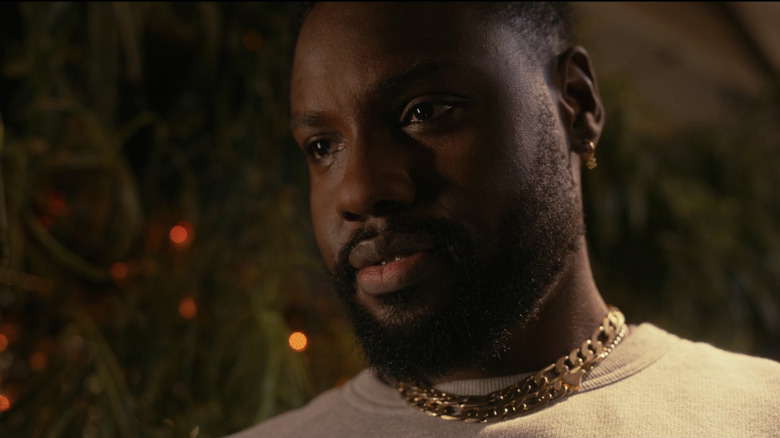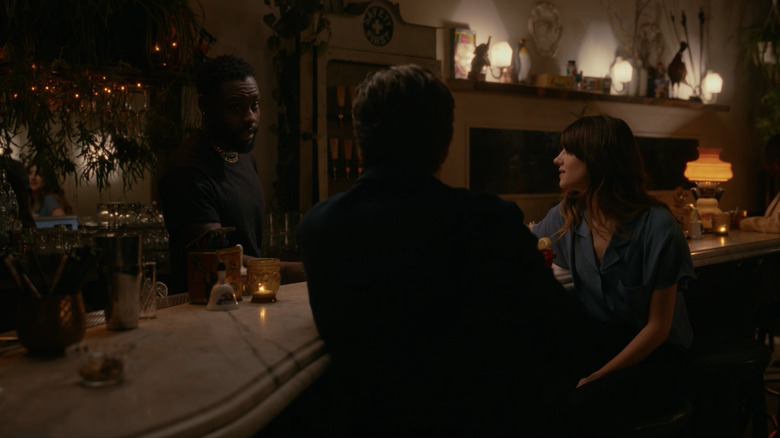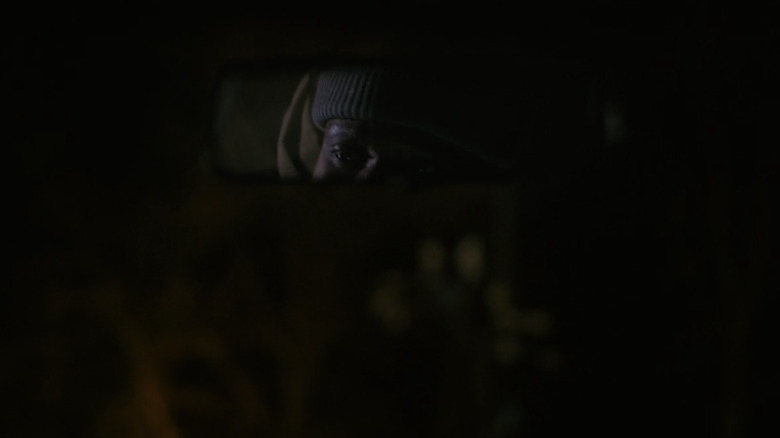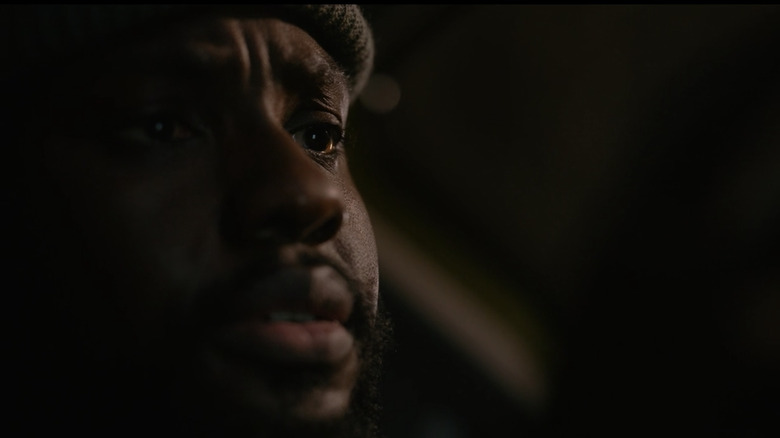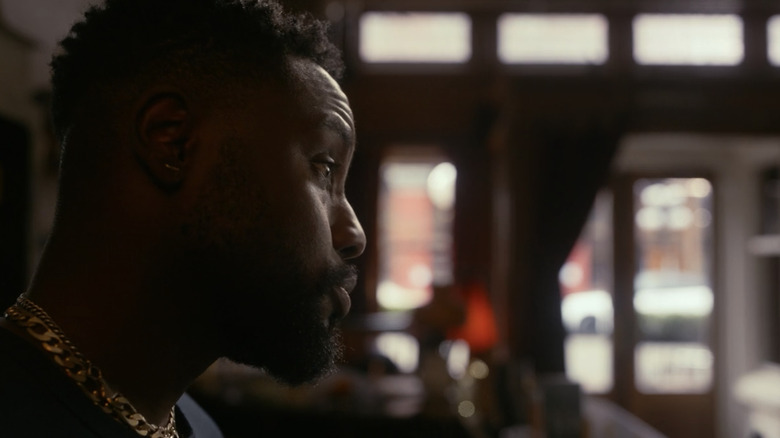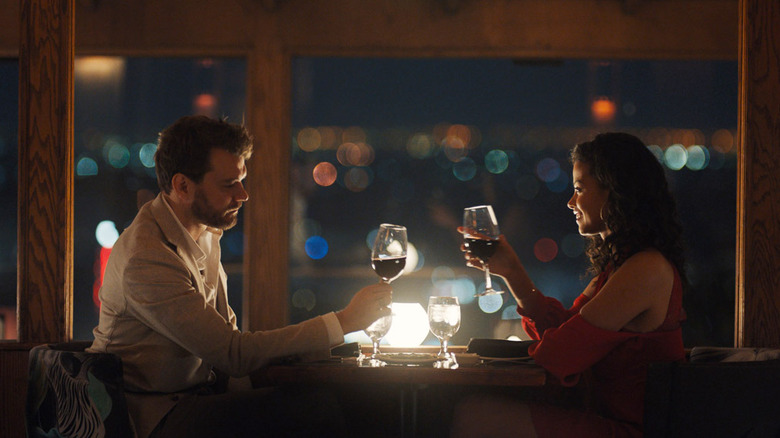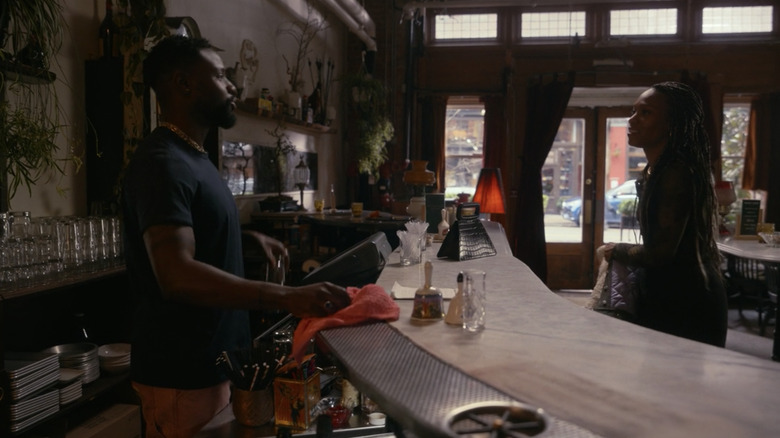Fresh Actor Dayo Okeniyi Talks The Power Of Social Thrillers And Working With Robert Rodriguez [Interview]
Last weekend saw the release of the much-anticipated Sundance darling "Fresh," a genre-subverting thriller which centers on the horrors of dating. Daisy Edgar-Jones leads the film as unlucky-in-love Noa, a woman who's grown tired of meeting terrible men on dating apps but seems to luck out when she has a grocery store meet-cute with a charming doctor, Steve (Sebastian Stan). While we the audience are plagued by clarity, spotting his red flags from a mile away, Noa finds herself plucked from the rom-com she thought their relationship would become and thrown into a horrifying, twisty tale with a light dash of cannibalism.
While Noa makes sense of her new reality, her best friend Mollie (Jonica T. Gibbs) grows more suspicious of the relationship and seeks help from her bartender ex-boyfriend Paul (Dayo Okeniyi). Though he comes in and out of the film, playing a small part in the overall story, Paul is a prime example of the way director Mimi Cave and writer Lauryn Kahn toy with audience expectations. This is part of what drew Okeniyi to the role, and in our conversation below, he had plenty to say about where Paul fits into the film's messaging and his overall experience of working with Cave, Kahn, and Gibbs. He also hints at some upcoming projects, including Robert Rodriguez's sci-fi thriller "Hypnotic" and another romance-gone-wrong horror flick, "Run Sweetheart Run."
This interview has been lightly edited for clarity, and contains mild spoilers for the ending of "Fresh."
'It plays on how we are conditioned to watch horror movies or thrillers and the roles that different people play in that story'
It really stood out to me how self-aware this movie and the script are, especially when it comes to horror and romance tropes. Is that something you felt while reading the script?
Absolutely. Last year, I got a call from my agents and they were like, "Yo, Dayo there's a script going around and it's scaring people." I said, "Oh, that's a good way to pitch it. Send it to me." And actually, they weren't able to send it to me. I auditioned for it and just had a rough description of the character. "He's a really cool bartender, a guy in this situation and he's trying to help his friend find her friend who's gone missing," kind of thing. I said, "OK, cool."
So two things that piqued my interest. Adam McKay was producing and I love everything that he does. So I was like, "Yep, I want to be in that world." And then another sweet spot was they were like, "When you come in, they also want you to come in and do a whole bunch of improv." Just knowing Adam McKay and the type of stuff that he does, I mean, that's literally one of the things that I want to do in my career. So I went in and read for it and very quickly got a call from Mimi Cave, the director. We had a conversation and I, honestly, I just fell in love with her vision immediately, because she sent me the script and she was like, "Read it and then let's get on the Zoom call and discuss." And I read it cover to cover in one sitting. That's always a good sign for me that I know I'm truly hooked on something, is where I cannot put the script down. I have to finish it.
Because there are other scripts that are great, but you read 10 pages and go make yourself a drink and you read another 20 pages and then you go eat lunch. But I sat and read the whole thing through and you're right, it plays on how we are conditioned to watch horror movies or thrillers and the roles that different people play in that story and the subverting expectations, especially, selfishly, with Paul's character. He's on the peripheries of the story. He's not a major character in the movie, but simultaneously a lot is hung on him narratively, because he is the red herring throughout the whole story.
'There are movies that come out that justify screaming in the movie theater'
When it gets to the end, you're like, "Oh great, the guy is here to save the day again." And Mimi and Lauryn go, "No." They go, "No, the women are going to save themselves from this story. This is their story. They got themselves in this hole and they have the agency and the willpower to get themselves out of it." And then we get to kill two birds with one stone, where, as a Black guy, he shows up and he hears a gunshot and screaming? "I'm out." We are out of here. I knew Black folks would have a cathartic experience when that moment came. Because at that moment when he shows up, what's everybody saying? "Get out of there, bro! Get out of there, man. What you doing there, bro?" So once he does that, I knew Black people would have a cathartic experience with him going, "Nah, I'm out of here, forget this. I don't want no smoke." So that's just great writing, where you get to kill two birds with one stone in that way.
I also feel like Paul, he's also part of the problem in society, right? I think the movie talks about the different horse blinders that men put onto the plight of women in society. There's the manifestation of evil itself with the character like Sebastian's, who I think spiritually shares similar traits with like a Harvey Weinstein or with a Cosby or somebody like that, that just actively goes out there to destroy women. And the ecosystem that men like that create with enablers, the people that Sebastian's characters sends his delicacies to in the movie. Then you have people like Paul who think they're righteous because "I don't do nothing to hurt women. I never hit a woman in my life. I never da da da," but who are silenced to the plight of women at the same time.
Men who, you know, you're getting paid more than a colleague at work, [even though] you do the same thing. And the only reason why you're getting paid more is because you're a man and you do nothing to rectify that. Or you witness a woman getting rough handled in the street on the train or on the bus or something and you just put your headphones in and you're like, "Oh, that's none of my business." There are different aspects of men who, in their silence, are also culpable to getting their fair shake in society. I think Paul also speaks to that as well. I just love a film where, at the end of the movie, there's going to be a huge conversation that's had.
I think that's what "Fresh" does. It's such a great movie. I think it's a communal movie, I think it's a movie you watch in a group. It's a movie where you scream and you shout and you throw popcorn. I am an advocate for a quiet movie theater. Don't be on your phone. Don't be texting, chew quietly all your Doritos before you get into the movie. I'm that guy. But every once in a while, I think there are movies that come out that justify screaming in the movie theater and almost having a call and response with the audience. And I think "Fresh" is that. I think it's just a fun movie in that way. But very intelligently written as well.
'I thought it was a 'Get Out' for women'
Like you said, there's that great tension between Paul showing up at the house and your brain is like "Get out of there, man," but also, him not going in to help is a conflict with his character.
Yeah, because we don't want Black folks dying in horror movies anymore. Obviously, there are worse things in the world. Ukraine is at war. But it's just one of those things where it was so exciting to have that. And we did toy with the idea of killing the character, make no mistake. But luckily Lauryn and Mimi just said, "No, we have an opportunity here to really play with some tropes and to really flip some things on their head," and I think it makes it a stronger film.
So was there a version where he does go in and try to help?
I don't know. [Laughs] You'd have to ask Mimi about that. I don't know.
It's also really funny that — and the audience definitely experiences this, and so do Paul and Daisy's character — they don't really know what movie they're in until they get to the house and have that rude awakening.
Absolutely.
It sounds like that was part of your experience reading the script.
Definitely. And I love what they did, editing-wise. I mean, when you get 30 minutes into a movie and that's when the opening credits kick in, I just thought that was such a genius act of editing because you come into one movie and then that thing happens, the opening thing comes out with the "Fresh" opening titles and then you go into opening sequence and you go, "Oh, oh, so this is the movie that we're actually watching."
I just thought it was so, so interesting. I'd never seen anything like that before, so that was definitely my experience reading the script as well. Because when I read, I was like, "Oh, this is some romantic comedy kind of a thing." And then it just goes off the rails and you go, "Oh my God." It just felt fun and fresh and new. Especially in this new genre of the social thriller, I just thought it was a "Get Out" for women. I just thought that was a really great way to take a new genre and give a new context.
'I don't really covet roles. I covet relationships. I covet getting the chance to work with extremely talented people'
So, you touched a bit on the experience of working with Mimi and I know you also have "Hypnotic" coming up and spent some time working with Robert Rodriguez. What were those collaborations like?
Very similar. With "Fresh," Paul, like I said, he's a peripheral character and he's actually more of a meta-character. We're using him to really play on the conditioning of audience members on what to expect rather than a narrative character. So that's a different thing. With "Hypnotic," I don't even know if I'm allowed to talk too much about my character there, but working with Mimi and Robert, what they share is an absolute knowledge of cinema, an absolute knowledge of how to, for lack of a better term, manipulate the expectations of audience members. And they do not sit on a high horse. "What are your ideas? Bring yourself to the character. Feel free to play with things. Feel free to use a script as a blueprint. We'll shoot the script and then you just do whatever you want to do."
It's so funny you've just brought up Robert. I never really thought about it, but they both gave me something that I've never had on movies like this. Like I said, a lot of really great big directors are very protective of their material. "No, just do the page. You are a pawn in my little movie, come here, serve your purpose and leave." But no, they were so ... everything, even with wardrobe, "How do you want to wear your hair?" The design of Paul, the tattoos, everything.
I mean, Mimi sent me three songs. It was Wu-Tang, The Art of Chessboxin'. She sent me like an Anderson .Paak song. We kind of created a playlist and she's like, "I think this is what he would listen to." When you have conversations with people like that, it's like, "Whoa, she knows her world. She wants to create a living, breathing character." And Robert Rodriguez, too, is the same way. I went in there and he was like, "What do you want to wear? What do you think he's going to wear? How do you think he walks? How do you think he talks? What kind of weapon does he carry?" All this stuff. I think it just makes a richer experience. I think filmmaking is always best when it is a collaborative experience. So yeah, she was amazing, Mimi Cave. I think she killed it. This is her first movie, too, which is like, what the — how did you do this on your first go? That's insane.
How big is that for you when you're picking projects? The idea of who you're collaborating with.
Everything. My first thing is always who's producing this, who's directing it. And then I look at the character afterward, because character is different. Character should challenge you. It's should scare you a little bit. So I want to know who's a part of it and who's making it, because I want to know how good it's going to be. So it allows me to be as afraid as possible to play the character, because I know I'm in good hands and I can experiment and I can fail. When it gets into that editing bay, the director's going to look out for me. For me, it's always "who's involved?" Character, that's always ... as an actor, I always hate the question of "What do you want to play? What's that one role that you're wanting to play?" It's like, I really don't care. If "Black Panther" directed by Ryan Coogler is better than "Black Panther" directed by Johnny Two Shoes. You could say, "Oh, I want to play Black Panther," but it's, "Whose Black Panther do you want to play?" So that's why I don't really covet roles. I covet relationships. I covet getting the chance to work with extremely talented people. People who are more talented and way smarter and way more savvy about this industry than I am, because they just make you look better, period.
'It'll be a really nice companion piece to 'Fresh' ... they touch on things differently'
In that case, do you have a person that you're dying to work with?
Oh my, where do I start? Ava DuVernay. I know I just mentioned Ryan Coogler. I mean, there's so many. Jane Campion, the Coen brothers — I could just keep going and going — David Fincher. Oh, Guillermo del Toro! I would serve catering on his movie. There's so many people that I really want to get a chance to work with. Absolutely. That's just a few. And then, you know Kevin Feige, I love the Marvel movies. I'm such a comic book nerd and it's like, Mr. Feige, holler at me, bro! Come on, let's work. So yeah, too many people. Too many.
I know this hasn't premiered yet, but you also have a role in "Run Sweetheart Run," which I think has a vaguely similar romance gone wrong plot. Is that a similarity you clocked?
It definitely was. It's funny because we actually filmed "Run Sweetheart Run" before, before "Fresh," years before, I think. I filmed "Run Sweetheart Run" in 2018, like a long time ago, until Amazon bought it. And then it just kind of went into another post-production phase of them trying to figure things out and then the pandemic happened and it was a whole thing, but that should also be coming out later this year. I know the release date, but I don't know if it's out there yet, so I'm not going to put myself in trouble and say when, but yeah. It should be coming out later this year. I remember reading "Fresh," and going, "Ooh, this is very similar," but the difference being the characters I play are vastly different from "Run Sweetheart Run" to "Fresh."
So that was the different thing. They are quite similar in the audience and the narrative and what they're trying to say about dating in the modern age and, yeah, male and female dynamics. But that decision was really ... Shana Feste, who made "Run Sweetheart Run," I've worked with her before. We did a movie called "Endless Love" years ago, earlier on in my career. So when she called me, she's one of those people where [if] she calls, "Hey, Dayo, I got this thing, you free?" I go, "Yeah. Right, sure. Let's do it. I don't have to read it. I don't have to know." So that was the experience on that one. I was getting a chance to work with Shana and Brian Kavanaugh-Jones, who are good friends. It's just different character, different energy, but yes, you're right. Quite similar.
And it has that similar social commentary, social thriller element to that? Which, like you said, is a genre that you're very gripped by.
A genre I love. Yes, it definitely is. It definitely has quite similar, but "Run Sweetheart Run" is ... it goes to another level of bonkers. I mean, I don't want to ruin anything. When "Run Sweetheart Run" drops later this year, go watch it as well. I think it'll be a nice companion piece. I'll put it that way. It'll be a really nice companion piece to "Fresh," to watch one and then the other and see how they touch on things differently.
'To me, that's the biggest sin, is when people of color are caricatured in storytelling'
When I spoke to Daisy earlier in the week, she was saying that despite this movie having really heavy material, there was a jokey and hysterical energy on set. Was that also the case for you?
100%. When you watch the movie, as far out there as it is, you have to have levity making the movie to not go crazy. You can't be too serious making a film like this because it's just too much dark on dark. I think that juxtaposition also plays in the movie as well. The movie needs to have those ebbs and flows to allow the audience to breathe. It's just brilliant, starting with that first date that she goes on with the scarf guy. There's so many ways that the movie gives the audience a warm blanket. That whole, "Thank God it's not me." There are filmmakers that do that very well. That's what allows you to laugh and then you second guess yourself, like, "Why would I laugh at that? Am I a disturbed person? Am I a psychopath that I would laugh at something like that?" But I actually think there's a psychological term for it. I can't remember right now, but it's one of those things where we are able to laugh at embarrassing moments in our past, that we thought was the end of the world for us when we were kids or something. But now we can laugh at that.
That's when it's striking a chord that's true. When a standup comedian goes on stage and just says something extremely true, that's what's funny about it. So I think our movie is touching on truth. And even though it's heightened and even though it's a little bit stylized, I think there's levity in that. There was a lot of levity making the movie and that shines through in the final product, as well. I think that's what makes it a nice rollercoaster ride. At the end of the day, it's a movie. It should be enjoyable and entertaining and a little bit educational and all that stuff as well. So I don't think people should be concerned if they find themselves laughing a little more in the film. You're not a psychopath. You're not crazy.
Even in the interactions with Paul and with Jojo's character, we see that. They're flirting, there's joking ... and then there's the whole "my friend is missing."
It's true to life. A lot of people use comedy to cope with crazy situations, especially Black folks. We hide behind our traumas with comedy all the time. I mean, we've created social platforms, like World Star. World Star has been thriving off of the trauma of Black folks since the end of time. But I think there's a cathartic experience in that, there's something cathartic about laughing at your traumas. It makes it small. It's a way to overcome it. I don't look down on that. I think that's a good thing. It makes some of these big issues palatable, for sure.
Can you talk more about that dynamic between Paul and Mollie?
It was so funny, because I get to set and Lauryn Kahn already wrote an incredible script. When we get to set, she's like, "Look guys, I'm not Black. I wrote this the best that I could. I really want you guys to have the freedom to add — no pun intended — but to add as much color as you want to the scene as possible." Most of that was written as-is. There are little flourishes there that Jojo and I were able to come up with. There's a handshake that we do in the movie and that was something that we came up with on our own. We were like, "Oh, to really put a nice button on the scene, a little gesture like that could speak to the history that they have together, because this is the only scene that they have in the movie." But you have to be able to create. You have to have the audience feel like they've known each other forever and ever. So, little flourishes like that, of course joking about the beard oil and things like that, "The beard is connecting," all that stuff was improvised on the day. But to Mimi and Jojo and Lauryn Kahn's credit, they encouraged that. They were like, "Just really bring that world in there. Really make them feel like three-dimensional people and not caricatures."
To me, that's the biggest sin, is when people of color are caricatured in storytelling. So to be able to come in there and create a character where you can go, "Oh, I know that guy. I know somebody like that." Or "I know that girl," or "I know why they didn't work together, they're both weirdly toxic in their own way." I think that's all fun. And Jojo is such a great actress, man. Strong. So when you throw something at her, she'll throw it back at you. We could keep going forever and ever like that.
"Fresh" is now streaming on Hulu.
